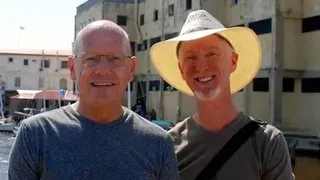January 17, 2011
Tunisia upheaval casts shadow on Arab summit
Kilian Melloy READ TIME: 4 MIN.
The head of the Arab League called Monday on rich Arab countries to extend a helping hand to their needy brothers as the turmoil in Tunisia cast a shadow over the Arab economic summit due to open in Egypt later this week.
The summit was meant to be a platform to discuss trade, business and investment, but officials say the Tunisian uprising - triggered by political repression, rising unemployment and skyrocketing food prices - will now top the conference's agenda.
In a speech to delegates in the Red Sea resort of Sharm el-Sheikh, League Secretary-General Amr Moussa urged rich Arab countries to help their poorer brothers.
"The less developed countries need help to build their economies and promote development," he said.
Moussa did not directly address the Tunisian crisis in his speech, but on Saturday he predicted that the unrest in the North African nation will have an impact on the rest of the Arab world.
Addressing a news conference Monday, Moussa said economic and political reform in the Arab world should go together. "Democracy and development should go hand in hand. Otherwise there will be no progress in the region. It is not sufficient to talk about economy alone," he said.
Tunisian Foreign Minister Kamal Merjan spoke for two hours in Sharm el-Sheikh to his Arab counterparts and assured them that the new government was in "full control" of the country, said a diplomat who was present for the meeting.
Merjan assured the Arab ministers that new elections would be held in the next 45 to 60 days and international monitors would be allowed to observe them, added the diplomat who spoke on condition of anonymity because he was not authorized to speak to the press.
Weeks of protests over corruption and political repression forced Tunisia's longtime president Zine El Abidine Ben Ali to flee the country Friday to Saudi Arabia.
Click image to see photos of riots in Tunisia
Reuters/Zohra Bensemra
Tunisian authorities were still struggling to restore order on Monday.
Hours before diplomats started their preparations for the summit, an Egyptian man set himself on fire in an apparent protest outside the parliament building in central Cairo. The incident appeared an attempt to copy the self-immolation and death last month of an unemployed 26-year-old Tunisian that triggered the protests leading to Ben Ali's overthrow.
Dozens of Egyptian activists have been waging daily protests in front of the Tunisian embassy in Cairo in solidarity with the Tunisians. Writing on Twitter, the Egyptian opposition leader and former head of the U.N. nuclear watchdog, Mohamed ElBaradei said: "Violence in Tunisia now is a product of decades of repression."
"(The) regime in Egypt must understand that peaceful change is only way out," he wrote.
Speaking at a news conference in Sharm el-Sheikh Monday, Egypt's Minister of Trade and Industry Rachid Mohamed Rachid urged Arab governments to address economic hardships faced by their people.
"Events in Tunisia underscore (the need) to jointly work to combat poverty and unemployment in Arab countries because part of the problems behind the events were economic," he said.
But Egyptian Foreign Minister Ahmed Aboul Gheit ruled out the possibility that Tunisia's political uprising will spread to other Arab countries, including Egypt.
"This is pure nonsense," he told reporters in Sharm el-Sheikh. "Those who are promoting fantasies and trying to ignite the situation will not achieve their goals and will only harm themselves," he warned.
"But if the summit chooses to address the Tunisian issue, it will," he said. "Overall, the will of the Tunisian people is the most important element in this regard."
Hundreds also demonstrated in Jordan and Yemen this week to demand that Ben Ali be brought to justice. Thousands of messages congratulating the Tunisian people flooded the Internet on Twitter, Facebook and blogs.
Even in the sleepy Sultanate of Oman, where social unrest is almost totally unheard of, around 2,000 people demonstrated near government ministries on Monday calling for higher wages and lower prices for food.
Dozens of Libyan citizens also demonstrated Thursday and Friday in the port city of Darnah to protest a delay in the delivery of subsidized housing units by the government, the Libyan daily Oya reported.
Libyan leader Moammar Gadhafi condemned the uprising in neighboring Tunisia, protesters chanted "Our rights, our rights."
Police later evicted some protesters from apartment blocs they seized earlier.
In a televised speech, Gadhafi said he was "pained" by the fall of the Tunisian government.
Gaddafi's comments reflect a nervousness among long-serving Arab leaders - the Libyan leader has been in power since 1969 - that the uprising in Tunisia will embolden anti-government protests elsewhere.
"What is this for? To change Zine El Abidine? Hasn't he told you he would step down after three years? Be patient for three years," Gadhafi said.
On Sunday, Syria sharply increased subsidies for energy in a reversal of policy after Tunisia's unrest.
The Syrian authorities announced it had increased the heating oil allowance for public workers by 72 percent to the equivalent of $33 a month.
In neighboring Jordan, the state announced a $125 million package of new subsidies for fuel and staple products like sugar following street protests this week.
Kilian Melloy serves as EDGE Media Network's Associate Arts Editor and Staff Contributor. His professional memberships include the National Lesbian & Gay Journalists Association, the Boston Online Film Critics Association, The Gay and Lesbian Entertainment Critics Association, and the Boston Theater Critics Association's Elliot Norton Awards Committee.






